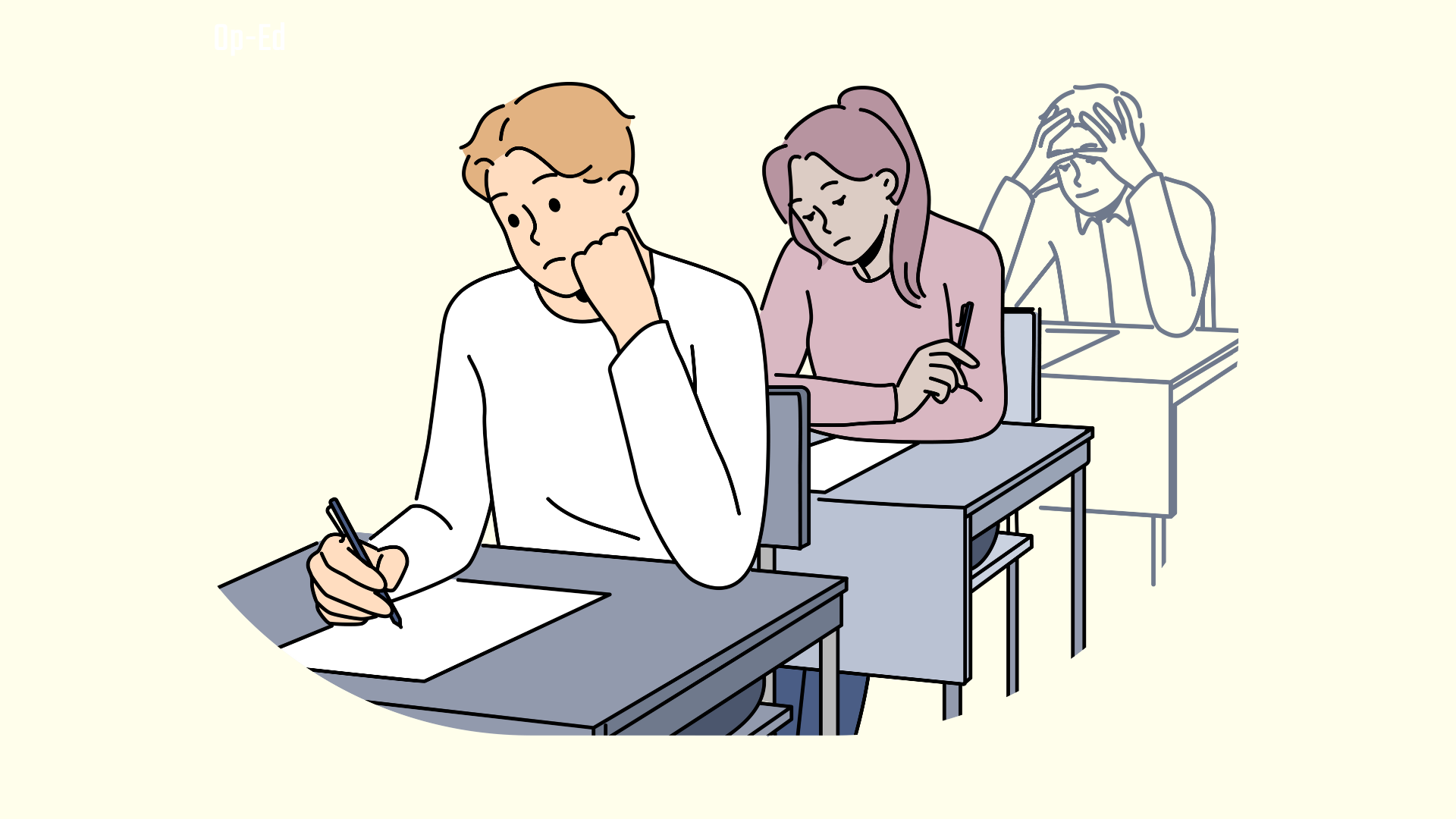Education | Mental health | Student wellbeing | Policy reform | Social responsibility

There is an eerie silence in the corridors of schools, a silence that turns loud with the emergence of crisis. You can feel it in the stories of students like Sangam and Saugat Chhetri, who found themselves sitting in an exam hall, their pens heavy in their hands four days after their father’s demise.
It comes across in the silent seconds between the words spoken by Sabin and Santosh Dangol as they explain how they took board exams despite mourning for their mother’s death, which had yet to sink into their minds and hearts.
And then there is the ache of silence, dumbfounding and cold, on the exam papers by Alok Jaiswal, each page etched not only with his answers but also the pain of the untreated appendicitis, as his body endured more than the burden of a simple test.
This silence is woven into the very fabric of Nepal’s education system — the silence of ironclad structures, and policies that leave no room for life’s unforeseen disruptions. Exams must go on instead. As if nothing ever happens in the world outside the classroom. As if life doesn't intervene — suddenly, sharply and uninvited.
But life does intervene. It courses through us all with forces beyond our control. And it is in sickness, grief, and accidents that we are defined — not as students, but as human beings. Yet our education system operates as though these incidents don’t occur at all, or even worse, are irrelevant. Exams must happen on a schedule, but not that they cannot bend when someone’s sick, mourning, or in pain.
If you’re still expected and made to sit at a cold desk, pen in hand, and perform, what then are we measuring? Learning or endurance?
A Special Consideration Policy is a process designed to ensure that candidates are not unfairly disadvantaged in assessments or exams due to circumstances beyond their control.
A call for such policy is more than a plea for reform — an acknowledgment of life’s unpredictability. To be human is to be vulnerable, and our vulnerabilities don’t adhere to academic calendars. They strike when they will, regardless of the school year.
In other parts of the world, systems recognised this need long ago. For example, the GCSE offers “special consideration” for students facing illness or coping with major life events — a quiet acknowledgment that sometimes life gets in the way and fairness often requires flexibility.
In Australia, the Special Provision policy provides extra time or altered conditions to students, sending a clear message: “We see you, we understand”. And learning happens best when we are given the space to be human.
On the contrary, there is no room for such flexibility in Nepal. Instead, there is a harsh silence of a system that refuses to bend. Students who face sickness or family crises and can’t take their exams are left with a stark choice: sit for the exam, no matter the personal cost, or lose an entire year. Fail now, or fail later. In this system, a rigid schedule, and the unspoken rule that suffering has no place take precedence — demanding obedience above all else.
What does it mean to create a Special Consideration Policy? It means acknowledging that life is unpredictable and doesn’t always follow a linear path. It means allowing students time to grieve and heal when someone’s beloved is lost or to recover their health, instead of asking to prove their learning with fears of losing a year of academic life hanging in the air. It is about designing a system that recognises the complexities of being a human.
The policy would provide flexibility in examination schedules and internal evaluations and waivers in attendance to truly reflect a student’s ability.
The present system is a denial of vulnerability as a part of the human condition and an outright injustice. Once institutionalised it becomes more than a personal albatross — a societal failure. The lack of a ‘Special Consideration Policy’ goes beyond lacking an administrative oversight implying that students' struggles and challenges are of no concern to the institution.
And we know instinctively that a system that can’t make space to address vulnerability not only fails students but is also a failure in itself.
Finally, the policy is a necessity, not a nicety. It recognises that education should not be a test of endurance but a path of growth and development. It affirms compassion is not a weakness but the foundation of a just society. In its absence, we only perpetuate a vicious circle of silence where young students like Alok and Saugat are compelled to carry their burdens in silence and solitude.
It is time to break this silence.
The author Aavash Subedi has started a petition @Change.org for policy for ‘Special Consideration for Students in Nepal’.
Read More Stories
Kathmandu’s decay: From glorious past to ominous future
Kathmandu: The legend and the legacy Legend about Kathmandus evolution holds that the...
Kathmandu - A crumbling valley!
Valleys and cities should be young, vibrant, inspiring and full of hopes with...
Understanding federal grants in fiscal federalism
Local budgets are where democracy meets the daily lives of citizensthis is a...